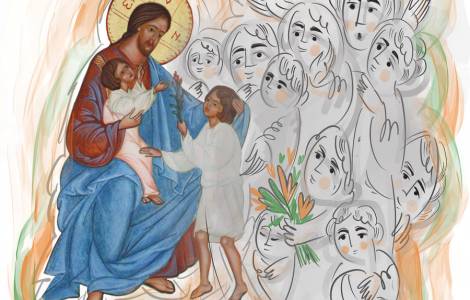
Lviv (Agenzia Fides) - "We have been working on this course to show that the safety of children is a shared responsibility across borders and we have a common Eastern European context to understand", said Marta Titaniec, President of the St. Joseph Foundation of the Polish Bishops’ Conference, at the presentation of the international project "SAFEGUARDING. Child Safety in the Church Environment" on the safety of children in the church environment at the Ukrainian Catholic University of Lviv (UCU). The project carried out by the UCU Center for Child Dignity, presented in the second half of April, aims to promote the protection of minors in ecclesial environments. As part of the project, the exhibition “Recognize. Respond" will be shown at the Dzyga Art Center and a course will be put online aimed at religious and lay people involved in the education of minors. The course, which is free and available upon registration on the portal, was created by a team of experts representing several Eastern European churches and whose members come from Croatia, the Czech Republic, Poland, Slovakia, Hungary and Ukraine. Among them is Ulyana Krekhovets, artist and iconographer, responsible for the artistic direction of the UCU Development Department and author of the visual component of the project, in which two colors stand out, as she herself said: green, the color of life, and orange, the color of security. The course, which consists of six videos of ten minutes each and working materials in PFD format, offers a comprehensive overview of the aspects of child protection: from the qualities that make an adult a good educator to the types of violence that can occur (physical, psychological, sexual, etc.), to the profile of the perpetrator and the measures to be taken in the event of a violent incident. Presenting the project, Khrystyna Shabat, head of the UCU Center for the Dignity of the Child, said that the aim of the project was, above all, to talk about child protection "without preaching" but "in a way that would make people think about this problem and pay attention to it". And commenting on the exhibition on the theme, she added: " We wanted the project to sound universal and be understandable to everyone, so we chose the language of art, a language that has no borders and is understood by everyone". Ivanka Rudakevych, head of projects and programs at the UCU Center for the Dignity of the Child and co-author of the course, also spoke of the “therapeutic effect” of art: "The value of the project − she added − is that we have teamed up with experts from Eastern Europe and have a common voice and a similar context in addressing the problem of child abuse". In the near future, the organizers plan to present and implement the project in each of the participating countries. The origin of the Center for the Dignity of the Child at UCU dates back to the 2019 Synod of Bishops of the Ukrainian Greek Catholic Church, where the issue of child protection was on the agenda. The center was founded in January 2021 and has since been used to train adults in learning the mechanisms for preventing child abuse and to raise awareness of (church and non-church) organizations and institutions on this topic. (CD) (Agenzia Fides, 3/5/2024)